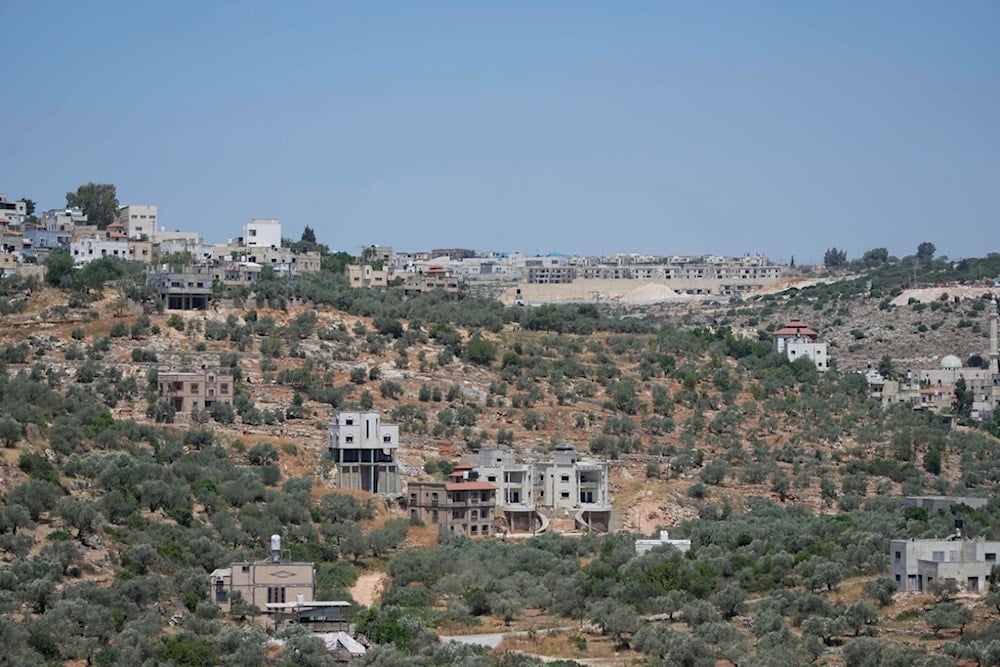Norway's Ethics Council reviews $500M in Israeli investments
Norway's $1.9 trillion sovereign wealth fund is investigating its investments in Israeli banks over concerns they financially support settlement construction in the occupied West Bank, with the Ethics Council citing documented underwriting practices and growing alarm over civilian suffering in Gaza.
-

A general view shows the Israeli settlement of Bruchin, center on top of a hill and adjacent to the West Bank village of Bruqin, that was under attack by Israeli settlers overnight and left several burnt vehicles and damaged homes, residents said, near Salfit, Friday, May 23, 2025. (AP Photo/Nasser Nasser)
The Ethics Council overseeing Norway's $1.9 trillion sovereign wealth fund has launched a formal investigation into the fund's holdings in several Israeli banks, prompted by concerns over their financial role in supporting settlement construction in the occupied West Bank.
The fund, renowned for applying ethical standards to its global investments, is examining the extent to which Israeli banks provide financial guarantees to settlers, shielding their funds in cases where developers fail to complete housing projects.
"We are appalled by the terrible suffering of the civilian population," said Council head Svein Richard Brandtzaeg in an interview with Reuters on May 22. "The massive military strikes by the Israeli army in the Gaza Strip no longer make any sense to me as to how they serve the goal of fighting terrorism and freeing the hostages." He added that while other practices are under review, this specific form of underwriting is "what is well documented."
Ethical Dilemma
At the close of 2024, the fund's investments in "Israel's" top five banks—Hapoalim, Bank Leumi, Israel Discount Bank, Mizrahi Tefahot, and First International Bank of Israel—totaled approximately $500 million, marking a 62% increase over the previous year. These institutions have long been flagged in a UN database for their links to settlement activities, which are considered illegal under international law.
Read more: Norway considers divesting Sovereign Wealth Fund in 'Israel'
Despite intensifying pressure on companies linked to occupied territories, the Council has chosen not to object to the fund's exposure to global accommodation platforms like Airbnb and Booking.com, which continue to list rentals in Israeli settlements.
Speaking to Reuters, Eli Ane Lund, head of the Council's secretariat, said that "the company's activity must have some kind of influence on the (ethical) violations. It's not (enough) to have a connection, it has to have something to do with the violation, it must contribute to it."
In mid-2024, the Council began a new review of 65 companies with operations in the West Bank and Gaza. Only two—Paz and Bezeq—were recommended for divestment, leading to the fund's withdrawal from their shares. By contrast, multinationals tied to the tourism and lodging sectors were found not to meet the threshold for ethical breaches warranting exclusion.
This decision has reignited criticism from human rights advocates, who argue that the Council's standards for recommending divestment are overly restrictive. Calls for a full-scale withdrawal from Israeli-linked assets—akin to Norway's swift exit from Russian investments following the start of the war in Ukraine—have so far failed to gain parliamentary traction. Most lawmakers continue to support the Council's targeted, case-by-case approach and are expected to formally endorse it this week.
Selective Divestment
The review comes at a time of heightened global outrage over "Israel's" assault on Gaza, which has resulted in the deaths of over 50,000 Palestinians, according to local health authorities, and left the coastal enclave in ruins.
Meanwhile, nearly 700,000 Israeli settlers now reside in the West Bank and East al-Quds, often in close proximity to 2.7 million Palestinians. While some Israeli companies operate across communities, their involvement in the settlement economy remains a focal point of ethical debates.
Read more: Ireland approves trade ban with Israeli settlements citing Gaza war
The Council's recommendations are submitted to Norway's central bank, which typically implements them gradually to avoid market disruptions. Final decisions are made public only after the divestment process is complete.

 4 Min Read
4 Min Read








